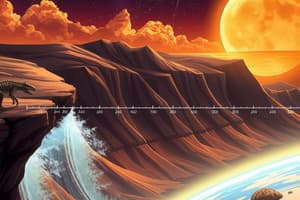Podcast
Questions and Answers
What primarily distinguishes the geologic time scale?
What primarily distinguishes the geologic time scale?
- The atmospheric conditions during each era
- The formation of supercontinents
- The types of fossils from various life-forms (correct)
- The presence of volcanic activity
What evidence supports the understanding of Earth's early history?
What evidence supports the understanding of Earth's early history?
- Sedimentary rock formations
- Ice core samples from polar regions
- Fossils preserved in silt or rock (correct)
- Fossils of modern animals
Which organism is mentioned as present during the Archean era?
Which organism is mentioned as present during the Archean era?
- Mammals
- Dinosaurs
- Cyanobacteria (correct)
- Coral reefs
What significant geological event occurred during the Proterozoic era?
What significant geological event occurred during the Proterozoic era?
What occurred towards the latter part of the Paleozoic Era?
What occurred towards the latter part of the Paleozoic Era?
During which era did aerobic eukaryotes become dominant?
During which era did aerobic eukaryotes become dominant?
What was the primary composition of the gases surrounding early Earth during the Hadean era?
What was the primary composition of the gases surrounding early Earth during the Hadean era?
Which of the following best describes the climate of Pangaea during the Triassic period?
Which of the following best describes the climate of Pangaea during the Triassic period?
What is one of the major features of the Mesozoic Era?
What is one of the major features of the Mesozoic Era?
How long did the Paleozoic era last?
How long did the Paleozoic era last?
What was one consequence of rising carbon dioxide levels during the Cretaceous period?
What was one consequence of rising carbon dioxide levels during the Cretaceous period?
What geological process initiated the break-up of the supercontinent Rodinia?
What geological process initiated the break-up of the supercontinent Rodinia?
What geological feature was formed due to the collision of the Indian plate with the Eurasian plate?
What geological feature was formed due to the collision of the Indian plate with the Eurasian plate?
Which era is characterized by the development of perissodactyls and artiodactyls?
Which era is characterized by the development of perissodactyls and artiodactyls?
What contributed to the cooling down of the climate during the Cenozoic Era?
What contributed to the cooling down of the climate during the Cenozoic Era?
During which period did the break-up of the supercontinent Pangaea accelerate due to rising sea levels?
During which period did the break-up of the supercontinent Pangaea accelerate due to rising sea levels?
Flashcards are hidden until you start studying
Study Notes
Geologic Time Scale
- Divides Earth’s history based on life-forms existing at particular times since formation.
- Fossils serve as primary evidence for geologic history, revealing a timeline predating humanity.
Precambrian Life
- Encompasses the Hadean, Archean, and Proterozoic eras.
Hadean Era
- Earth transformed from gas and dust to molten rock surrounded by unbreathable gases.
- Cooling process allowed the formation of the Earth's crust.
Archean Era
- Emergence of cyanobacteria and simple, soft-bodied sea creatures.
- Notable fossil discovery: Coronacollina acula, dating back 560 million years.
Proterozoic Era
- Characterized by tectonic plate movements forming supercontinent Rodinia.
- Marked by cooling temperatures leading to Ice Ages.
- Dominance of aerobic eukaryotes and emergence of first multicellular organisms.
Paleozoic Era
- Known as “Old Life,” beginning over 540 million years ago, lasting more than 300 million years.
- Era divided into six periods: Cambrian, Ordovician, Silurian, Devonian.
- Geological activity included break-up of Rodinia into Gondwana and Laurentia.
- Climate fluctuated with glaciations; eventual formation of supercontinent Pangaea.
- Ended with the largest mass extinction, wiping out approx. 90% of marine species and 70% of land animals.
Mesozoic Era
- Known as the era of dinosaurs, dominated by reptiles adapted to dry climates.
- Gymnosperms thrived due to protective seeds suitable for arid conditions.
Triassic Period
- Pangaea existed as a single landmass with extensive desert coverage.
Jurassic Period
- Rising sea levels flooded coastal regions, promoting a wetter climate and facilitating the break-up of Pangaea.
Cretaceous Period
- Elevated carbon dioxide levels resulted in increased global temperatures.
- Ended with a mass extinction event likely caused by asteroid or comet impact.
Cenozoic Era
- Began 65 million years ago and continues today, divided into Paleogene, Neogene, and Quaternary periods.
- Significant mountain range formations, including the Himalayas, due to tectonic collisions.
- Marked by the proliferation of diverse mammals, including marsupials and placental mammals, as well as species of perissodactyls and artiodactyls.
Studying That Suits You
Use AI to generate personalized quizzes and flashcards to suit your learning preferences.




